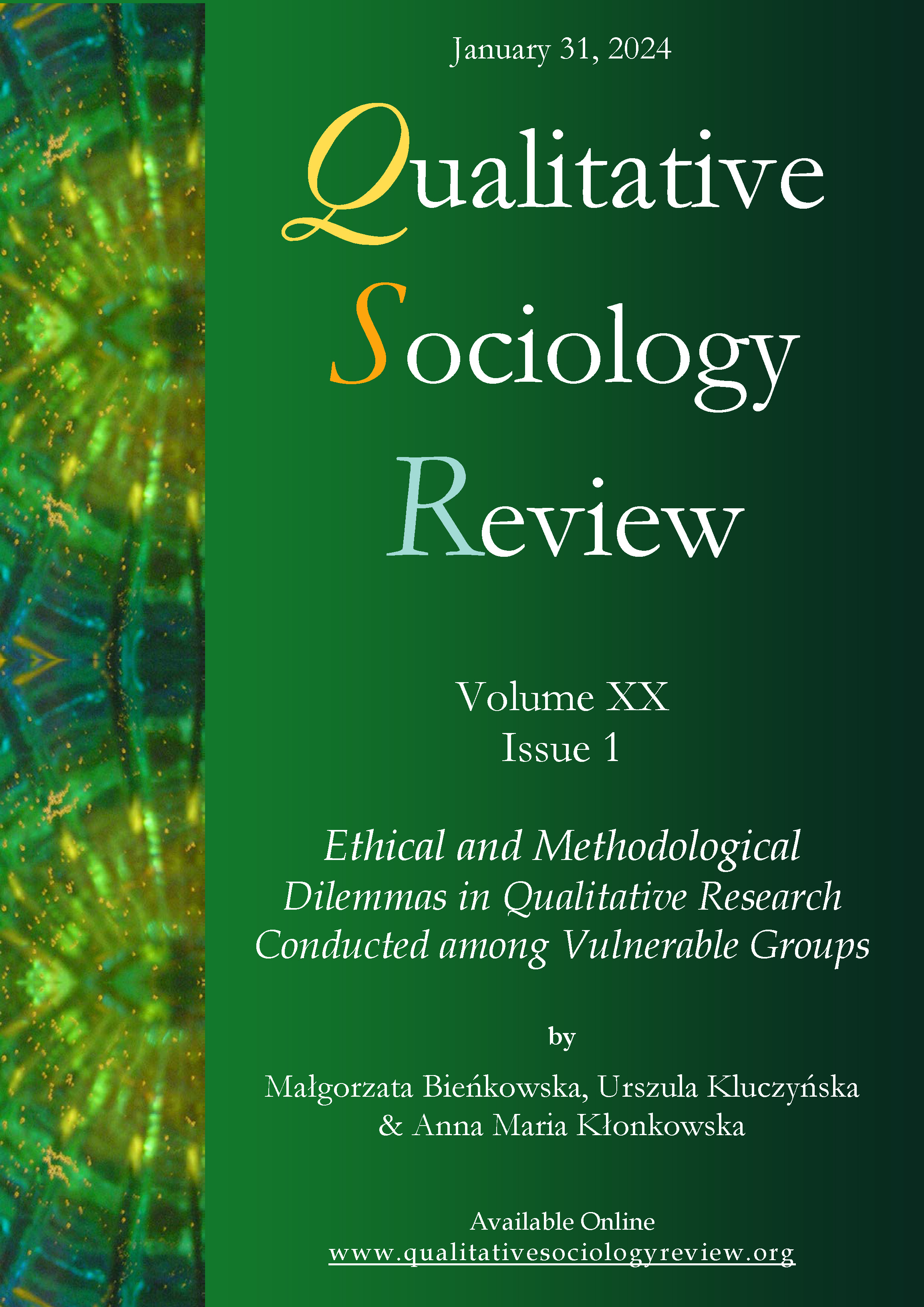The Conceptual Metaphor as an Ethical Kaleidoscope in Field Research
DOI:
https://doi.org/10.18778/1733-8077.20.1.03Keywords:
Metaphor, Ethical Kaleidoscope, Researcher Identity, Researcher Sensitivity, Ethical CodeAbstract
Attention to metaphor as a tool for cognition and action has already been called by the classic work by Georg Lakoff and Mark Johnson—Metaphors We Live By (1980). However, some four decades after this publication’s first edition, the role of metaphor as a useful instrument in empirical research seems to have been forgotten. Therefore, the first step taken in the text at hand is to highlight that codes of ethics neither resolve nor befit the dynamically shifting circumstances of research conducted in the field. Ethical codes are often insufficient. Hence, an objective here will be to critically assess the broad application of such codes in general. The second step will be to turn to metaphor as a tool in developing the sociological imagination as understood by C. Wright Mills. The metaphor can also assist in finding oneself when confronted with difficult, ambiguous circumstances that may arise during fieldwork. Metaphor as a tool, as an ethical kaleidoscope coherently links the field research experience precisely with the sociological imagination.
Downloads
References
Bauman, Zygmunt. 1993. Postmodern Ethics. New York: Blackwell Publishers.
Google Scholar
Bauman, Zygmunt. 1995. Life in Fragments: Essays in Postmodern Morality. Oxford: Wiley-Blackwell.
Google Scholar
Bloch, Natalia. 2011. “Teren a władza, czyli kto tu rządzi? Moje doświadczenia w badaniu uchodźców tybetańskich [Space and Power, or Who Rules Here? My Experience Researching Tibetan Refugees].” Pp. 209-235 in Teren w antropologii. Praktyka badawcza we współczesnej antropologii kulturowej [Terrain in Anthropology. Research Practice in Contemporary Cultural Anthropology], edited by T. Buliński and M. Kairski. Poznan: Wydawnictwo Naukowe UAM.
Google Scholar
Buliński, Tarzycjusz. 2014. “Ruchoma wiedza terenowa: Perspektywa antropologii procesualnej [Mobile Field Knowledge: Processual Anthropology Perspective].” Zeszyty Etnologii Wrocławskiej 2014/2(21):97-111.
Google Scholar
Burzyński, Robert. 2012. Metafory jako narzędzie poznania polityki i oddziaływania politycznego [Metaphors as a Tool for Learning about Politics and Political Influence]. Ph.D. dissertation. Faculty of Political Science and International Studies. University of Warsaw, Poland.
Google Scholar
Carrithers, Michael. 1992. Why Humans Have Cultures: Explaining Anthropology and Social Diversity. Oxford: Oxford University Press.
Google Scholar
Cassirer, Ernest. 1963. An Essay on Men: An Introduction to a Philosophy of Human Culture. New Haven, CT: Yale University Press.
Google Scholar
Clifford, James. 1997. “Spatial Practices: Fieldwork, Travel, and the Disciplining of Anthropology.” Pp. 185-222 in Anthropological Locations: Boundaries and Grounds of a Field Science, edited by A. Gupta and J. Ferguson. Los Angeles: University of California Press.
Google Scholar
DOI: https://doi.org/10.2307/jj.5973134.13
Denzin, Norman K. and Yvonna S. Lincoln. 2005. The Sage of Handbook of Qualitative Research, 3rd ed. London: Sage Publications.
Google Scholar
Flis, Maria. 1994. Leszek Kołakowski – teoretyk kultury europejskiej [Leszek Kołakowski—A Theoretician of European Culture]. Cracow: Universitas.
Google Scholar
Foucault, Michel. 2006. Discipline and Punish: The Birth of the Prison. New York: Vintage Books.
Google Scholar
DOI: https://doi.org/10.2307/j.ctv120qr2d.34
Horolets, Anna. 2016. “Badacz jako gość [Researcher as a Guest].” Przegląd Socjologii Jakościowej 12(3):54-69.
Google Scholar
DOI: https://doi.org/10.18778/1733-8069.12.3.04
Kodeks Etyki Socjologa [Code of Ethics of a Sociologist]. 2012. Retrieved June 21, 2022 https://pts.org.pl/wp-content/uploads/2016/04/kodeks.pdf
Google Scholar
Kołakowski, Leszek. 1971. “Ethics without a Moral Code.” TriQuarterly 22:153-182.
Google Scholar
Krzeszowski, Tomasz. 2020. “Wstęp do wydania polskiego [Introduction to Polish Edition].” Pp. 7-29 in Metafory w naszym życiu [Metaphors We Live By], edited by G. Lakoff and M. Johnson. Warsaw: Wydawnictwo Aletheia.
Google Scholar
Lakoff, George and Mark Johnson. 1980. Metaphors We Live By. Chicago: University of Chicago Press.
Google Scholar
Lewis, Clive Staples. 1947. Miracles. London, Glasgow: Collins, Fontana Books.
Google Scholar
Marody, Mirosława. 2021. “Odpowiedzialność, nieodpowiedzialność, współodpowiedzialność [Responsibility, Irresponsibility, Co-Responsibility].” Pp. 77-93 in Kultura (nie)odpowiedzialności. Społeczne konteksty zaniechanej cnoty [Culture of (Ir)responsibility. Social Contexts of Abandoned Virtue], edited by M. Bogunia-Borowska. Warsaw: PWN.
Google Scholar
Mills, C. Wright. 2000. The Sociological Imagination. Oxford: Oxford University Press.
Google Scholar
Nowak, Jacek. 2010. “Metodologiczne rozterki współczesnych antropologów: obserwacja uczestnicząca w praktyce [Methodological Dilemmas of Contemporary Anthropologists: Participant Observation in Practice].” Studia Socjologiczne 4(199):121-145.
Google Scholar
Popper, Karl. 2002. The Logic of Scientific Discovery. New York: Routledge Classics.
Google Scholar
Ricoeur, Paul. 1992. Oneself as Another. Chicago: University of Chicago Press.
Google Scholar
Rorty, Richard. 1989. Contingency, Irony, Solidarity. New York: Cambridge University Press.
Google Scholar
DOI: https://doi.org/10.1017/CBO9780511804397
Rorty, Richard. 2002. “Etyka zasad a etyka wrażliwości [Ethics of Principles and Ethics of Sensitivity].” Teksty Drugie 1-2:51-63.
Google Scholar
Słownik Języka Polskiego [Dictionary of the Polish Language]. Retrieved July 13, 2022 https://sjp.pwn.pl/slowniki/odpowiedzialno%C5%9B%C4%87.html
Google Scholar
Sztompka, Piotr. 2021. “Logika i granice odpowiedzialności [Logic and Limits of Responsibility].” Pp. 13-34 in Kultura (nie)odpowiedzialności. Społeczne konteksty zaniechanej cnoty [Culture of (Ir)responsibility. Social Contexts of Abandoned Virtue], edited by M. Bogunia-Borowska. Warsaw: PWN.
Google Scholar
Środa, Magdalena. 2020. Obcy, inny, wykluczony [The Stranger, the Other, the Excluded]. Gdansk: Wydawnictwo Słowo/Obraz Terytoria.
Google Scholar
Tokarczuk, Olga. 2020. Czuły narrator [The Tender Narrator]. Cracow: Wydawnictwo Literackie.
Google Scholar
Znaniecki, Florian. 1973. Socjologia wychowania [Sociology of Education], vol. 2. Warsaw: Państwowy Instytut Wydawniczy.
Google Scholar
Downloads
Published
How to Cite
Issue
Section
License

This work is licensed under a Creative Commons Attribution-NonCommercial-NoDerivatives 4.0 International License.











